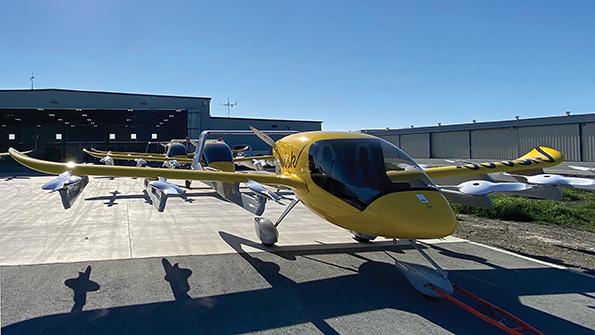
When Boeing formed its HorizonX innovation unit in 2017, some of its first venture capital investments were in electric and autonomous aviation. The trend continued later that year when Boeing acquired Aurora Flight Sciences and, in mid-2018, when it formed the Boeing NeXt future transportation unit.
- Funding will advance sixth-generation eVTOL
- Wisk stays focused on autonomous air taxis
The path seemed to be cemented in mid-2019, when Boeing formed a strategic partnership with Kitty Hawk, an electric vertical-takeoff--and-landing (eVTOL) vehicle pioneer backed by Google co-founder Larry Page. By year-end, the partnership had become a joint venture, Wisk, focused on urban air mobility.
Then toward the end of 2020, amid the 737 MAX crisis, Boeing shuttered the NeXt unit. The company’s internal Cargo Air Vehicle and Passenger Air Vehicle eVTOL programs were shut down. A year later, Boeing spun off its venture capital arm and with it the company’s stakes in 40 different startups.
But the joint venture with Kitty Hawk survived the turmoil and, on Jan. 24, Boeing announced it was investing a further $450 million in Wisk. The additional funding will advance development of Wisk’s sixth-generation eVTOL vehicle, which is set to be unveiled in the second half of 2022 and is targeted to be the first autonomous all-electric passenger aircraft certified in the U.S.
An autonomous aircraft is expected to take longer to certify than the piloted eVTOL air taxis Wisk’s rivals are developing. The joint venture has not disclosed when it expects FAA approval but says: “Within five years following the certification of the sixth-generation aircraft, Wisk intends to operate one of the industry’s largest fleets of advanced air mobility eVTOL aircraft.
“In this time frame, Wisk anticipates close to 14 million annual flights, bringing time savings to over 40 million people across 20 cities—all with zero emissions,” the company says. Wisk has already agreed to operate up to 30 aircraft for U.S. service provider Blade Urban Air Mobility. The sixth-generation eVTOL is expected to be larger than Wisk’s current two-seat Cora prototype.
“This is definitely the right time to put half a billion [dollars] into Wisk,” Boeing CEO David Calhoun told analysts on the company’s Jan. 26 full-year results call. “The world wants autonomy and the world wants electric. And this is going to be our application of those two technologies and [our opportunity] to put it into real service by way of certification . . . and it will serve a niche we don’t serve today.”
The additional investment delivers on the enthusiasm Calhoun expressed in a June 2021 interview with Aviation Week: “Wisk is probably the highest on our list as a program I want to do and double down on. It’s electric. It displaces an incredibly inefficient market on urban mobility. It . . . virtually takes noise out of the equation.”
Penetrating a new market is not Boeing’s only reason for investing in Wisk. “That’s not necessarily why you do it if you don’t think there’s a long-term avenue for both autonomy and electric and a lot to learn in the process. I view this as a high priority,” Calhoun told analysts Jan. 26.
Brian Yutko, Boeing vice president and chief engineer for sustainability and future mobility, said in 2021 that engineers from its Aurora Flight Sciences subsidiary were being transferred to Wisk to help develop and certify the autonomous eVTOL.
Autonomy is widely acknowledged as being key to affordable large-scale air taxi operations, but Wisk is unusual among eVTOL startups in that it is developing a self-flying vehicle from the outset. Most of the others plan to start with piloted operations and evolve to autonomy over time.
Citing its plan to operate large numbers of aircraft, Wisk says: “The scale of this fleet is enabled by the company’s autonomous technology, a competitive differentiator and industry-recognized key to scaling services and maximizing safety.” Wisk has completed more than 1,500 unmanned test flights so far.





